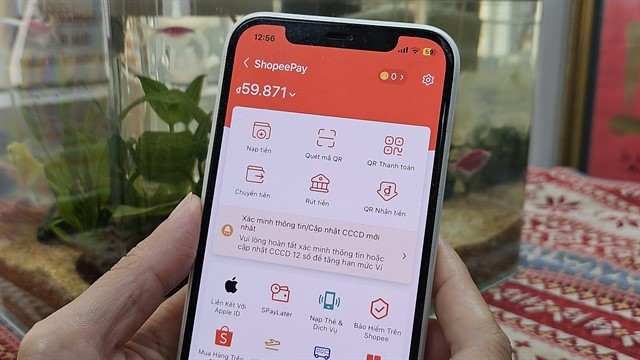Electronic money is supplied by banks, foreign bank branches or intermediary payment service providers and corresponds to the amount of money prepaid by customers.

Additional regulations on electronic money are being introduced in a new decree on non-cash payments.
Under the decree, banks and foreign bank branches are authorised to issue and provide electronic wallets and prepaid cards. These activities must comply with the regulations set by the State Bank of Vietnam (SBV).
According to Article 3, Section 12, in the effective Decree No. 52/2024/NĐ-CP, starting from July 1, electronic money refers to the stored value of Vietnamese đồng on electronic devices.
It is supplied by banks, foreign bank branches or intermediary payment service providers and corresponds to the amount of money prepaid by customers.
Intermediary payment service providers offering electronic wallet services must maintain a total balance across all accounts, ensuring it is not lower than the combined balance of all electronic wallets issued to customers.
Services are restricted to electronic wallets linked to customers' payment accounts or debit cards.
Phạm Anh Tuấn, Director General of the SBV Payment Department, said that the electronic representation of the Vietnamese currency is known as electronic money.
The recently enforced Decree No. 52 clearly outlines the entities responsible for supplying electronic money, including banks, foreign bank branches and intermediary payment organisations.
Tuấn also highlighted that this provision marks a significant milestone as it allows electronic wallets to serve as a recognised payment method, introducing a new dimension for payment intermediaries.
Currently, electronic wallets are restricted to payments via linked bank accounts and facilitate internal transfers among wallets within payment intermediary organisations.
However, the SBV plans to issue new circulars and guidelines that align with Decree No. 52/2024/NĐ-CP.
These regulations will allow electronic wallets to operate as accounts, with the requirement of being linked to payment accounts at banks, differentiating them from traditional bank accounts.
Activating an electronic wallet requires a linked account, Tuấn said, adding that future guidelines from the SBV will clearly specify that electronic wallets must remain linked at all times.
Previous instances of wallets becoming disconnected have prompted the need for stricter management. Violations by payment intermediaries regarding electronic wallets will be subject to penalties under the relevant laws and regulations.
Suppliers have a responsibility to report suspicious transactions related to money laundering in the payment intermediary sector, in accordance with the Anti-Money Laundering Law.
Suspicious signs include rapid deposits and withdrawals from electronic wallets, significant daily transactions with minimal or zero account balances, frequent small deposits followed by substantial transfers to other wallets, or large withdrawals to bank accounts or debit cards and vice versa.
Regular transfers of small amounts between multiple electronic wallets within a short timeframe or the movement of funds across numerous wallets are also concerning. Any sudden and abnormally large deposits into customers' electronic wallets should be promptly reported.
Recently, the Ministry of Public Security has uncovered various transactions involving deposits, withdrawals and transfers between electronic wallet accounts linked to criminal activities such as gambling and betting networks.
Tightening the regulations for electronic money will play a crucial role in preventing money laundering and combating cybercrime. — VNS





